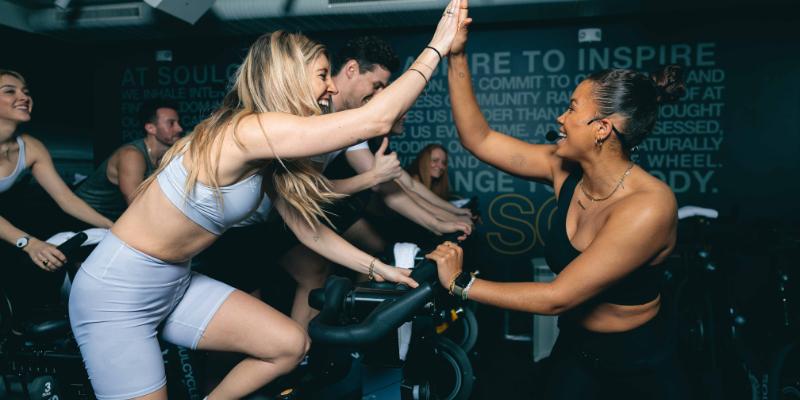Get fit stay sharp: 10 ways to beat procrastination


By Eleanor Hope-Jones
•
Jul 25, 2023
Did you know physical activity could be the cure to your procrastination woes?
It’s because of a little thing called self-efficacy. Self-efficacy is how much you believe in yourself to do the tasks needed to achieve a specific goal. So if your goal is to save £350, your self-efficacy would be how much you believe you’ll be able to set that money aside each week and not spend it.
But what’s that got to do with exercise?
Keep reading to learn all about how exercise can help you be your most productive self and our ten tips for integrating movement into your working routine.
The curious case of exercise, self-efficacy, and procrastination
In a 2021 study on college students, psychologists found that physical activity reduced procrastination.
We know that on a chemical level exercise improves concentration, gives you a sharper memory, and increases energy. In fact, exercise releases the same focus chemicals in your brain as certain ADHD medications.
But the psychologists also measured how getting a sweat on improved students' psychological sense of self-efficacy, something chronic procrastinators will struggle with. This is all to do with a phenomenon called goal transference, or your brain's tendency to extrapolate from one area of life and apply it to another.
In practice, this might sound like If I can run a 5k why can’t I write a 5,000-word report? If I can squat 70K why can’t I present in front of a room of 10 people?
So all in all exercise:
Releases chemicals that help you focus.
Improves your self-efficacy.
Reminds your brain it can do hard things.
Keep reading for our top tips on how to make workouts a part of your daily working routine and how to harness that adrenaline high for ultimate productivity.
1. Start small
If you’re trying to get into an exercise habit it’s tempting to set yourself a strict routine, like going to the gym for two hours every day after work or running a 5k three times a week.
The problem? You’ll wear out your willpower. You may be able to stick to your new routine for a few weeks, or even a couple of months, but it's unlikely to become an unconscious habit or leave you enough willpower to do other things.
Like not procrastinating deep work.
Focus on starting where you are. If you don’t exercise at all, can you take a ten-minute walk each morning with your coffee? If you already walk a lot but want to pick up something higher intensity, can you embed a specific weekly class at a convenient time?
The goal here is to add a little more onto your plate in a way that’s still enjoyable. Over time as your body becomes stronger, and your mind gets used to the new routine, your one small change won’t cost you as much willpower. And you can increase the intensity and frequency of your workouts.
Start small today with an Awe Walk
Awe walks are live and on-demand guided walks to help you detach from work and refresh your mind. Join virtually, walk in your surroundings, and experience something novel.
Walking can be a great way to start getting back into movement, as well as cultivating a sense of awe and wonder in everyday life.
2. Focus on one thing at a time
Linking two hard things together, like exercise and work, can make them both seem insurmountable and overwhelming.
But your brain may be tricking you a bit here.
Exercise actually reduces feelings of overwhelm as it helps us manage our stress response. According to Harvard Medical School this is because it reduces levels of stress hormones like cortisol and adrenaline and boosts endorphin levels.
After exercise you actually tend to feel more positive, relaxed, and motivated for the rest of the day, meaning getting work done is likely to be easier.
Start training your brain to focus on one task at a time, rather than thinking about everything that needs doing:
Rather than getting dressed you’re just putting on your shoes.
Rather than going to work out, you’re just getting in the car.
Rather than working out, you’re just doing 5 minutes of cycling.
You’ll be amazed at how much you get done.
Discover how to unlock flow states through deep work

3. Set achievable performance goals
When we start exercising it can be tempting to focus on extrinsic goals like weight loss or long-term goals like going from couch potato to running a 10k. This makes the benefits of exercise flung far into the future, which can be hard for our animal brains to value in the present.
Using near-term performance goals can help bridge this gap, and make us excited to do the work in the present. Rather than weight loss can you focus on performance goals like lifting 5kg more or running 0.5km faster than last week?
James Clear, author of the #1 New York Times bestseller, Atomic Habits, refers to this idea as continuous improvement. He defines continuous improvement as “a dedication to making small changes and improvements every day, with the expectation that those small improvements will add up to something significant.”
4. Prepare a plan for your workout and deep work
It’s easy to say “I’ll work out and do some work tomorrow”, but it's a lot harder to action. Be specific in how you plan your workout and workload to make it more likely that you achieve your goals.
A specific plan might look like:
I’ll join the 7am SoulCycle ride and work out for 45 minutes.
I’ll eat breakfast and take a quick shower.
I’ll join the FLOWN 9am deep dive and aim for 5 pages of that report.
In fact, studies by the University of Oxford show that goal specificity shapes motivation, so to avoid failure, make time for planning.
5. Look out for that post-workout dopamine rush
According to habit expert James Clear, to build a habit you have to make it satisfying. But when it comes to both exercise and work it can be all too easy to berate ourselves for achieving anything less than perfection.
Unfortunately, this self-critique will make exercise and work all the harder to achieve.
By observing your body after you’ve worked out, and noticing that rush, you’ll begin to associate exercise with satisfaction regardless of how “well” you’ve done. You can then ride that wave to a successful day at work.
The more you create that reward loop the longer you’ll keep up your new habit.
Breathwork can also help you find those endorphins
Whether you need to dispel some work stress, shake off ‘brain fog’ or get hyped for your next work out breathwork may be just the thing.
FLOWN offers both live and on-demand airflow sessions so you can utilize the benefits of breath.
6. Don’t go it alone
Work and workouts are both easier with friends as it utilizes the power of body doubling. Body doubling is the practice of working in the presence of others to anchor attention and make it easier to focus on tasks.
Multiple studies have since shown body doubling to be a powerful motivator that causes us to work harder, think more deeply, be more creative, and even feel what we are doing is more meaningful.
FLOWN X SoulCycle both use the power of body doubling with every session
FLOWN X SoulCycle both use the power of body doubling with every session
This allows members to work or exercise in the virtual presence of others to leverage the proven benefits of positive social pressure, making focus easier.
7. Get your gear ready in advance
Simple but effective, getting your exercise gear and work equipment ready the night before will prime you for success. This is because it reduces the cognitive load on the version of you that actually has to do the workout and work tomorrow.
Make sure it’s visible and ideally in a place that interrupts your normal routine. If you always have a cup of coffee first thing, consider putting your water bottle and trainers in front of the kettle.
Some people even take this to the extreme by sleeping in their workout gear!
8. Pair exercise and deep work with something you love
Research by behavioral scientist Katy Milkman from the University of Pennsylvania refers to this concept as temptation bundling. Think about how you can pair a behavior with long-term benefits, with a behavior that feels good in the present.
This might look like only listening to your favorite podcast when you go for a run, or only drinking nice coffee when you sit down to do deep work.
Over time this Pavlovian conditioning will help you build positive associations with something you previously found hard.
9. Match your activity to your circadian rhythm
Your circadian rhythm is a master clock in your brain that interprets cues like light and dark, temperature and diet to decide how awake and alert you need to be.
Biologically an average adult’s circadian rhythm means they begin to wake up between 6 am and 8 am, with a few hours of peak mental alertness from 9 am. We tend to have a cognitive slump from around 1 pm to 4 pm.
So it’s worth thinking about when you’re at your mental peaks and troughs to beat procrastination and get moving. Remember everyone’s unique, as things like spending a lot of time inside or working late at night can all influence your circadian rhythm.
So reflect on your rhythms, when you might need a boost from a 20-minute jog or to take a break from deep work, and build the perfect procrastination-beating routine for you.
10. Experiment and optimize
Rome wasn’t built in a day and neither were great exercise and work habits. Consider experimenting with:
Different types of exercise
Different times to exercise
Different places to perform deep work
Your routine isn’t some static thing that once discovered never changes. As you grow and change, allow your routine to grow with you. Whether that’s upping your workouts as you become stronger, or scaling back from work and movement due to injury and illness.
Create a work and exercise routine that energizes you
Reframing what wellbeing means from a 5am rise and grind to a flexible, evolving routine that works for you can be a bit of a mental shift. But by prioritizing small changes and focusing on those all-important endorphins you get from a good workout or focus session you’ll actually be able to stick to it.
Fitness and mental wellness go hand in hand, so start taking care of your body and watch the productivity of your mind soar.










